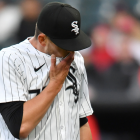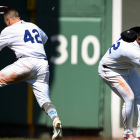On Monday, MLB commissioner Rob Manfred announced that Pete Rose would not be reinstated from baseball's permanently ineligible list. Manfred was correct to make this decision. Rose over the years has been forthright on these matters only when basic honesty intersected with convenience, and his ongoing associations with gambling prove he's not sufficiently reconstructed. More to the point, Rose was aware that, by gambling on baseball, he risked lifetime banishment.
As part of his Monday statement, though, Manfred also said this:
"With this background in mind, let me clarify the precise nature of the issue before me. Under the Major League Constitution, my only concern has to be the protection of the integrity of play on the field through appropriate enforcement of the Major League Rules. It is not a part of my authority or responsibility here to make any determination concerning Mr. Rose's eligibility as a candidate for election to the National Baseball Hall of Fame (“Hall of Fame”). In fact, in my view, the considerations that should drive a decision on whether an individual should be allowed to work in Baseball are not the same as those that should drive a decision on Hall of Fame eligibility. Indeed, in considering Mr. Rose's application for reinstatement, I, as Commissioner of Baseball, must determine the risk that Mr. Rose will commit a violation of MLB's rules (most significantly Rule 21) following his reinstatement that may impact the integrity of the game. By contrast, the issue of whether Mr. Rose should be eligible for Hall of Fame election under the bylaws of that organization presents an entirely different policy determination that is focused on a range of considerations distinct from the more narrow question before me — i.e., whether I believe that Mr. Rose's reinstatement would be consonant with the policy rationale underlying Rule 21. Thus, any debate over Mr. Rose's eligibility for the Hall of Fame is one that must take place in a different forum."
The commissioner is right about this, too. Rose's status with MLB should have little bearing on whether he's allowed to have his Hall of Fame case considered by the BBWAA or the relevant veterans' committee.
In fact, the timing of events way back in 1989, when Rose was first placed on the permanently ineligible list, make it clear that the Hall should allow the all-time hits leader to have his day before one voting body or the other.
It wasn't until 1991 that the Hall's overseers ruled that players on that permanently ineligible list were also ineligible for induction. That, of course, took place roughly two years after Rose was placed on said list. It was also the year before he was to appear on the BBWAA ballot for the first time. So the Hall of Fame existed for 55 years without such a mandate, but, suddenly and conveniently, the board of directors was sufficiently motivated to create such a rule just in time to exclude Rose. This seems patently unfair, at least in an ex post facto sense. Rose's eligibility for induction into the Hall should be either grandfathered in or the ban on ineligible players should be lifted.
To the latter point, there's no harm in letting players have their day before either the BBWAA or the veterans' committee -- voting bodies that are already tasked with considering issues of character and scruples. In that sense, any kind of ban isn't even necessary. Look no further than the candidacies of Barry Bonds and Roger Clemens as evidence that voters will apply issues of morality to even obvious, inner-circle should-be Hall of Famers.
Personally, I would vote for Rose for the Hall of Fame. The "character clause" in the Hall of Fame ballot instructions is risibly vague, lends itself to inconsistent application, and sometimes winds up being wielded as a cudgel in petty conflicts. In a vacuum, Rose is of course a bleedingly obvious first-ballot Hall of Famer, and at the very least he deserves to have his case presented to the voters. The Hall of Fame is a baseball museum, not a gallery of upstanding gentlemen, and it should tell baseball's story. Rose, obviously, is central to that story. (And so are Bonds and Clemens.) Sure, some of Rose's implements are already in the Hall, but Rose the player belongs, too. Even if you disagree with that, consider the hazards of commandeering the process and retroactively decreeing that voters can't even ponder his case.
As for the details -- i.e., which voting body will consider Rose, who retired from playing after the 1986 season -- the Hall can figure that out, unprecedented though this case may be. After all, it's not unaccustomed to dreaming up rules and policies that apply solely to Pete Rose.






















